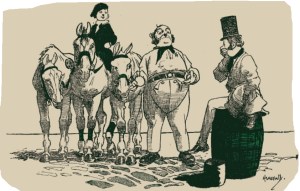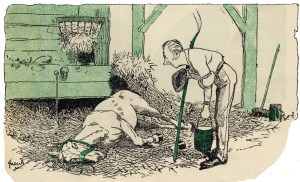< Previous |
Index |
Next > |
Sam's Racehorse
by Marriott Edgar
Illustrations by John Hassall
Sam's Racehorse is a nice little arithmetical puzzle.
Read the poem and then answer the question at the bottom of the page.
When Sam Small retired from the Army
He'd a pension of ninepence a day,
And seven pounds fourteen and twopence
He'd saved from his rations and pay.
He knew this 'ere wasn't a fortune,
But reckoned with prudence and care
He'd find some investment to save him
From hard work and things like that there.
He thought he'd invest in a race orse,
As apart from excitement and fun
He'd be able to sit down in comfort
And live on the money he won.
He knew buying 'orses was tricky,
But that didn't daunt him at all;
He said "They must rise early 't mornin
As wants to play tricks on Sam Small!"
When he called on the local 'Orse-dealer
Surprise rooted him to the spot,
For he found 'twere his old Comp'ny Sergeant,
Whose kindness he'd never forgot.

'Twere a happy reunion on both sides,
Their pleasure at meeting was great,
For each hoped to diddle the other
And wipe a few grudges off slate.
The Sergeant brought out his race 'orses,
For which he asked various sums;
They hadn't a tooth left between them,
But Sam knew their age by their gums.
Sam studied their lines and deportment
As Sergeant were trotting them round,
And told him he reckoned their value
Were fourpence, per race 'orse, per pound.

Now the Sarg. had a filly called Buster
As he hadn't said nothing about,
But when Sam turned his nose up at t'others
He thought as he'd best trot her out.
Sam were struck with her youthful appearance,
Though there wasn't much light in the place,
For her teeth were all pearly and even
And there wasn't a line on her face.
The Sergeant asked Sam twenty guineas,
But Sam, who were up to his tricks,
Pretended he thought he'd said shillings
And offered him eighteen and six.
In the end he paid eight guineas for her,
And when he'd got home with the goods
He reckoned he'd not done so badly,
For three of the guineas was duds.
But later, when he thought it over,
A doubt through his mind seemed to creep,
If Buster were all she were painted,
Why the Sergeant had sold her so cheap.

He very soon found out the answer
When he looked at her close in her stall,
She'd the marks where her face had been lifted
And a mouth full of false teeth an' all.

The little walk home had fatigued her
And the cold air had started her cough;
Sam reckoned he'd best see the Sergeant
And tell him the bargain was off.
The place were locked up when he got there,
And he realized Sergeant had bunked,
So back he went home in a dudgeon
And found Buster lying; defunct.

Sam knew if he wanted to sell her
He mustn't let on she were dead,
So he raffled her down at the Darts Club;
Forty members at five bob a head.
The raffle were highly successful,
They all came in every man jack
And so's winner'd have no cause to grumble
Sam gave him his five shillings back.
So here's the question: After buying and selling the horse, how much did Sam gain (or lose)?
For those unfamiliar with Britain's pre-decimal currency (pre-1971):
| Value | Coin's colloquial name | Written as | £p equivalent |
| Halfpenny | Ha'penny | 1⁄2d. | 0.21p |
| Penny | Copper | 1d. | 0.42p |
| Threepence | Thruppenny Bit | 3d. | 1.25p |
| Sixpence | Tanner | 6d. | 2.5p |
| Shilling | Bob | 1/- | 5p |
| Florin | Two bob bit | 2/- | 10p |
| Half crown | Half a dollar | 2/6 | 12.5p |
| Crown | Dollar | 5/- | 25p |
| Ten shillings or Half sovereign | Ten bob | 10/- | 50p |
| Pound or Sovereign | Quid or Nicker | £1 | £1 |
| Guinea | Guinea | £1/1/- | £1.05p |
...and picking some of the amounts mentioned in the poem: | |||
| Ninepence | 9d. | ||
| Eighteen and six | 18/6 | ||
| Seven pounds, fourteen and twopence | £7/14/2 | ||
So how much did Sam gain / lose? (Answer)
| privacy policy | © seiyaku |